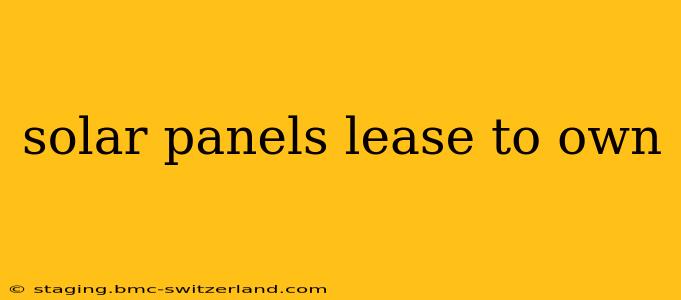Are you considering going solar but hesitant about the upfront cost? A solar panel lease-to-own program might be the perfect solution. This guide will explore everything you need to know about this increasingly popular option, helping you decide if it's right for your home and energy needs.
What is a Solar Panel Lease to Own?
A solar panel lease-to-own agreement, sometimes called a solar power purchase agreement (PPA) with an option to buy, allows you to use solar panels installed on your roof without the significant initial investment required for outright purchase. You make monthly payments for a set period, often 5-10 years. At the end of the lease term, you have the option to purchase the system outright for a pre-determined price, often significantly reduced from the original cost. This approach offers a balance between the financial benefits of leasing and the long-term ownership advantages of outright purchase.
How Does a Solar Panel Lease to Own Work?
The process generally involves these steps:
- Assessment and System Design: A solar company assesses your energy needs and roof suitability to design a custom solar panel system.
- Lease Agreement: You sign a lease-to-own agreement specifying monthly payments, the lease term, and the purchase option at the end. This contract details all terms, including the buyout price.
- Installation: The solar company installs the panels on your roof.
- Energy Production and Payment: You begin using the solar energy generated by your system and make your monthly payments.
- Purchase Option: After the lease term, you exercise your option to purchase the system for the agreed-upon price or choose to continue leasing (if allowed in your contract).
What are the Advantages of a Solar Panel Lease to Own?
- Lower Upfront Costs: This is the primary attraction. You avoid a large initial investment, making solar power accessible to more homeowners.
- Predictable Monthly Payments: Similar to a utility bill, you'll have consistent monthly payments, making budgeting easier.
- Potential Tax Benefits: Depending on your location and the specific terms of your agreement, you may be able to claim tax credits or deductions. It's essential to consult with a tax professional.
- System Maintenance: The solar company usually handles system maintenance and repairs during the lease period.
- Ownership After the Lease: At the end, the system is yours!
What are the Disadvantages of a Solar Panel Lease to Own?
- Higher Overall Cost: While the upfront cost is low, you might end up paying more overall than if you purchased the system outright.
- Limited Customization: Your options for system design might be more limited compared to a direct purchase.
- Contractual Obligations: You're bound by the lease agreement for a set period, and early termination might incur penalties.
- Depreciation: You won't benefit from any potential depreciation tax deductions during the lease period, as you don't own the system.
- Potential for Increased Rates: Some contracts include clauses that can lead to rate increases over time.
Is a Solar Panel Lease to Own Right for Me?
This depends on your individual financial situation, energy consumption, and long-term goals. Consider these factors:
- Your Financial Situation: Do you have the upfront capital to purchase a system outright? If not, a lease-to-own arrangement might be more suitable.
- Your Energy Consumption: The size and efficiency of the system need to match your energy needs.
- Your Credit Score: Lenders often consider your credit score when approving lease-to-own agreements.
- The Lease Terms: Carefully review the contract, including the monthly payments, lease term, buyout price, and any potential penalties.
How Much Does a Solar Panel Lease to Own Cost?
The cost varies significantly depending on factors such as system size, location, and the solar company. It’s crucial to obtain multiple quotes from different providers to compare prices and terms.
What Happens if I Don't Buy the System at the End of the Lease?
The specifics depend on your contract. Some agreements allow you to renew the lease, while others might require you to remove the system. Clarify this aspect before signing the contract.
What are the differences between solar panel lease-to-own and solar panel financing?
While both options offer alternatives to upfront purchase, they differ significantly. Financing typically involves a loan to buy the system outright, while lease-to-own provides usage rights and an option to buy at the end. Financing offers quicker ownership, but requires a larger initial down payment and credit approval.
By carefully considering the pros and cons and getting multiple quotes, you can determine if a solar panel lease-to-own program is the right choice for your home's energy needs and your financial situation. Remember to read the fine print and seek professional advice before making any decision.
